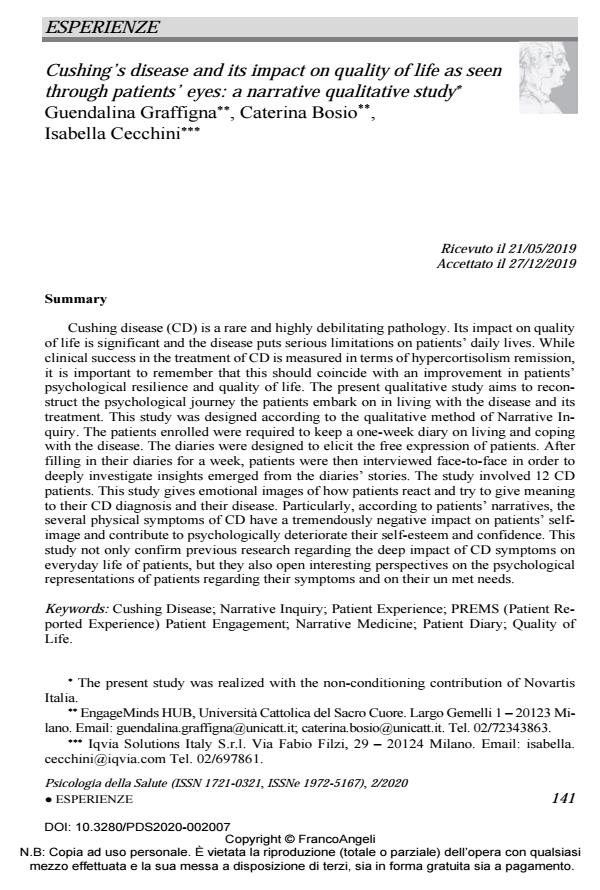Cushing’s disease and its impact on quality of life as seen through patients’ eyes: a narrative qualitative study
Titolo Rivista PSICOLOGIA DELLA SALUTE
Autori/Curatori Guendalina Graffigna, Caterina Bosio, Isabella Cecchini
Anno di pubblicazione 2020 Fascicolo 2020/2
Lingua Inglese Numero pagine 17 P. 141-157 Dimensione file 527 KB
DOI 10.3280/PDS2020-002007
Il DOI è il codice a barre della proprietà intellettuale: per saperne di più
clicca qui
Qui sotto puoi vedere in anteprima la prima pagina di questo articolo.
Se questo articolo ti interessa, lo puoi acquistare (e scaricare in formato pdf) seguendo le facili indicazioni per acquistare il download credit. Acquista Download Credits per scaricare questo Articolo in formato PDF

FrancoAngeli è membro della Publishers International Linking Association, Inc (PILA), associazione indipendente e non profit per facilitare (attraverso i servizi tecnologici implementati da CrossRef.org) l’accesso degli studiosi ai contenuti digitali nelle pubblicazioni professionali e scientifiche.
Cushing disease (CD) is a rare and highly debilitating pathology. Its impact on quality of life is significant and the disease puts serious limitations on patients’ daily lives. While clinical success in the treatment of CD is measured in terms of hypercortisolism remission, it is important to remember that this should coincide with an improvement in patients’ psy-chological resilience and quality of life. The present qualitative study aims to reconstruct the psychological journey the patients embark on in living with the disease and its treatment. This study was designed according to the qualitative method of Narrative Inquiry. The pa-tients enrolled were required to keep a one-week diary on living and coping with the dis-ease. The diaries were designed to elicit the free expression of patients. After filling in their diaries for a week, patients were then interviewed face-to-face in order to deeply investigate insights emerged from the diaries’ stories. The study involved 12 CD patients. This study gives emotional images of how patients react and try to give meaning to their CD diagnosis and their disease. Particularly, according to patients’ narratives, the several physical symp-toms of CD have a tremendously negative impact on patients’ self-image and contribute to psychologically deteriorate their self-esteem and confidence. This study not only confirm previous research regarding the deep impact of CD symptoms on everyday life of patients, but they also open interesting perspectives on the psychological representations of patients regarding their symptoms and on their un met needs.
La malattia di Cushing è una patologia rara e altamente debilitante. Mentre il successo clinico nel trattamento della malattia di Cushing si misura in termini di remissione dell’ipercortisolismo, è importante ricordare che ciò dovrebbe coincidere con un migliora-mento della resilienza psicologica e della qualità della vita dei pazienti. Il presente studio qualitativo mira a ricostruire il percorso psicologico che i pazienti intraprendono nella con-vivenza con la malattia. Questo studio è stato progettato secondo il metodo qualitativo Nar-rative Inquiry. Ai pazienti intervistati è stato richiesto di compilare un diario semi strutturato per una settimana raccontando di come vivono e affrontano la malattia. Successivamente, i pazienti sono stati intervistati per indagare a fondo gli insight emersi dalle storie dei diari. Lo studio ha coinvolto 12 pazienti con malattia di Cushing. Questo studio fornisce una fo-tografia del bagaglio emotivo con cui i pazienti reagiscono e cercano di dare un senso alla loro diagnosi di malattia di Cushing e alla loro vita con la malattia. In particolare, secondo i racconti dei pazienti, i diversi sintomi fisici della malattia di Cushing hanno un impatto estremamente negativo sull’immagine di sé dei pazienti e contribuiscono a deteriorare psi-cologicamente la loro autostima e fiducia in sé stessi. Gli autori sostengono che le testimo-nianze raccolte nel presente studio, non solo confermano le precedenti evidenze riguardanti l’impatto profondo dei sintomi della malattia di Cushing sulla vita quotidiana dei pazienti, ma aprono anche interessanti prospettive sulle rappresentazioni psicologiche dei pazienti riguardo ai loro sintomi e ai loro bisogni non soddisfatti.
Parole chiave:Malattia di Cushing; medicina narrativa; patient engagement; esperienza del paziente; diario del paziente; qualità della vita.
- “The healthcare system did fail me repeatedly”: a qualitative study on experiences of healthcare among Canadian women with Cushing’s syndrome Sarah C Jones, Sarah Nutter, Jessica F Saunders, in BMC Primary Care 329/2024
DOI: 10.1186/s12875-024-02580-5
Guendalina Graffigna, Caterina Bosio, Isabella Cecchini, Cushing’s disease and its impact on quality of life as seen through patients’ eyes: a narrative qualitative study in "PSICOLOGIA DELLA SALUTE" 2/2020, pp 141-157, DOI: 10.3280/PDS2020-002007